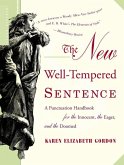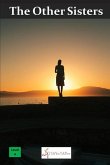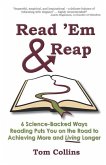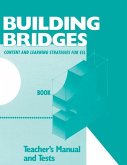Nancy Morrow, Marlene B. Clarke
Currents of Inquiry: Readings for Academic Writing
Musik: Morrow, Nancy
Nancy Morrow, Marlene B. Clarke
Currents of Inquiry: Readings for Academic Writing
Musik: Morrow, Nancy
- Broschiertes Buch
Andere Kunden interessierten sich auch für
![The New Well-Tempered Sentence The New Well-Tempered Sentence]() Karen Elizabeth GordonThe New Well-Tempered Sentence17,99 €
Karen Elizabeth GordonThe New Well-Tempered Sentence17,99 €![The Other Sisters The Other Sisters]() I Talk You Talk PressThe Other Sisters11,99 €
I Talk You Talk PressThe Other Sisters11,99 €![Read 'Em & Reap: 6 Science-Backed Ways Reading Puts You on the Road to Achieving More and Living Longer Read 'Em & Reap: 6 Science-Backed Ways Reading Puts You on the Road to Achieving More and Living Longer]() Tom CollinsRead 'Em & Reap: 6 Science-Backed Ways Reading Puts You on the Road to Achieving More and Living Longer22,99 €
Tom CollinsRead 'Em & Reap: 6 Science-Backed Ways Reading Puts You on the Road to Achieving More and Living Longer22,99 €![Learn Russian with Short Stories Learn Russian with Short Stories]() Kees van den EndLearn Russian with Short Stories9,99 €
Kees van den EndLearn Russian with Short Stories9,99 €![Murder in Marrakech Murder in Marrakech]() I Talk You Talk PressMurder in Marrakech11,99 €
I Talk You Talk PressMurder in Marrakech11,99 €![Saori and the Storm Saori and the Storm]() I Talk You Talk PressSaori and the Storm11,99 €
I Talk You Talk PressSaori and the Storm11,99 €![Teacher's Manual for Building Bridges Teacher's Manual for Building Bridges]() ChamotTeacher's Manual for Building Bridges25,99 €
ChamotTeacher's Manual for Building Bridges25,99 €-
-
-
Produktdetails
- Verlag: McGraw Hill LLC
- Seitenzahl: 528
- Erscheinungstermin: November 1997
- Englisch
- Abmessung: 235mm x 165mm x 19mm
- Gewicht: 685g
- ISBN-13: 9781559348188
- ISBN-10: 1559348186
- Artikelnr.: 21694681
Hinweis: Dieser Artikel kann nur an eine deutsche Lieferadresse ausgeliefert werden.
- Herstellerkennzeichnung
- Libri GmbH
- Europaallee 1
- 36244 Bad Hersfeld
- 06621 890
To the Instructor To the Student Alternate Contents by Academic Genre Alternate Thematic Contents 1. FINDING YOUR PLACE IN THE CONVERSATION: BECOMING AN ACADEMIC READER The Reading-Writing Relationship
Why Do We Read?
The Readers Role in the Reading Process
Understanding Rhetorical Context
Reading for the Intended Meaning
Using Genre Conventions To Construct Meaning
Using the Rules of Argument To Interpret Texts
Some Final Thoughts about Academic Reading and Writing
2. THE CAMPUS AND THE WIDER COMMUNITY Mike Rose, Entering the Conversation
Chester E. Finn, Jr., and Bruno V. Manno, Behind the Curtain
Phillip E. Johnson, The Creationist and the Sociobiologist: Two Stories about Illiberal Education
Daphne Patai and Noretta Koertge, Introduction to the World of Womens Studies
J. Wade Gilley, The Distributed University
George D. Kuh, et al, Some Good News about Campus Life
David M. Hummon, College Slang Revisited: Language, Culture, and Undergraduate Life
3. WORK AND PLAY Reg Theriault, Old Blue Collars, Young Blue Collars, and That Little Place Youre Going To Get in the Country
Herbert Applebaum, WorkPast, Present, and Future
Juliet B. Schor, Time Squeeze: The Extra Month at Work
Stanton Wheeler, Double Lives
Joan Ryan, Little Girls in Pretty Boxes
Merlisa Lawrence Corbett, Telecommuting: The New Workplace Trend
Lotte Bailyn, Two Women at Work: Balancing Work and Family
Susan Willis for The Project on Disney, Public Use
Private State
4. MEDIA, TECHNOLOGY, AND LITERACY Neil Postman, The Medium Is the Metaphor
Deborah Brandt, Accumulating Literacy: Writing and Learning to Write in the Twentieth Century
Susan B. Neuman, Television and Reading in the Lives of Young Children
Michael C. Berthold, Jeopardy!, Cultural Literacy and the Discourse of Trivia
Don Adams and Arlene Goldbard, Steal this TV: How Media Literacy Can Change the World
Lana K. Rakow and Vija Navarro, Remote Mothering and the Parallel Shift: Women Meet the Cellular Telephone
Pamela E. Kramer and Shelia Lehman, Mismeasuring Women: A Critique of Research on Computer Ability and Avoidance
Charles McGrath, The Internets Arrested Development
5. ETHICS, LAW, AND JUSTICE Benjamin Sells, What Does the Law Want?
Leon Kass, Am I My Brothers Keeper? Reflections on Compassion and Justice
Albert W. Alschuler, Our Faltering Jury
Craig Horowitz, Law and Disorder: How the Juvenile Justice System Is Letting Kids Get Away with Murder
Mark Hansen, Final Justice: Limiting Death Row Appeals
Lynn Hecht Schafran, Is the Law Male?
Ellen Alderman and Caroline Kennedy, The Right to Privacy: High-Tech Monitoring in the Workplace
Hadley Arkes, Moral Obtuseness in America
Richard Weisberg, From Jefferson to the Gulf War: How Lawyers Have Lost Their Golden Tongue
In each chapter: Chapter Introduction
Questions for Discussion
Questions for Research and Writing
Crosscurrents: Questions for Connecting the Readings
Appendix A Voices from Our Past: Conversations in American Cultural History Appendix B Research and Knowledge: A Short Guide to Gathering and Using Outside Sources Index Remote Mothering and the Parallel Shift: Women Meet the Cellular Telephone
Pamela E. Kramer and Shelia Lehman, Mismeasuring Women: A Critique of Research on Computer Ability and Avoidance
Charles McGrath, The Internets Arrested Development
5. ETHICS, LAW, AND JUSTICE Benjamin Sells, What Does the Law Want?
Leon Kass, Am I My Brothers Keeper? Reflections on Compassion and Justice
Albert W. Alschuler, Our Faltering Jury
Craig Horowitz, Law and Disorder: How the Juvenile Justice System Is Letting Kids Get Away with Murder
Mark Hansen, Final Justice: Limiting Death Row Appeals
Lynn Hecht Schafran, Is the Law Male?
Ellen Alderman and Caroline Kennedy, The Right to Privacy: High-Tech Monitoring in the Workplace
Hadley Arkes, Moral Obtuseness in America
Richard Weisberg, From Jefferson to the Gulf War: How Lawyers Have Lost Their Golden Tongue
In each chapter: Chapter Introduction
Questions for Discussion
Questions for Research and Writing
Crosscurrents: Questions for Connecting the Readings
Appendix A Voices from Our Past: Conversations in American Cultural History Appendix B Research and Knowledge: A Short Guide to Gathering and Using Outside Sources Index
Why Do We Read?
The Readers Role in the Reading Process
Understanding Rhetorical Context
Reading for the Intended Meaning
Using Genre Conventions To Construct Meaning
Using the Rules of Argument To Interpret Texts
Some Final Thoughts about Academic Reading and Writing
2. THE CAMPUS AND THE WIDER COMMUNITY Mike Rose, Entering the Conversation
Chester E. Finn, Jr., and Bruno V. Manno, Behind the Curtain
Phillip E. Johnson, The Creationist and the Sociobiologist: Two Stories about Illiberal Education
Daphne Patai and Noretta Koertge, Introduction to the World of Womens Studies
J. Wade Gilley, The Distributed University
George D. Kuh, et al, Some Good News about Campus Life
David M. Hummon, College Slang Revisited: Language, Culture, and Undergraduate Life
3. WORK AND PLAY Reg Theriault, Old Blue Collars, Young Blue Collars, and That Little Place Youre Going To Get in the Country
Herbert Applebaum, WorkPast, Present, and Future
Juliet B. Schor, Time Squeeze: The Extra Month at Work
Stanton Wheeler, Double Lives
Joan Ryan, Little Girls in Pretty Boxes
Merlisa Lawrence Corbett, Telecommuting: The New Workplace Trend
Lotte Bailyn, Two Women at Work: Balancing Work and Family
Susan Willis for The Project on Disney, Public Use
Private State
4. MEDIA, TECHNOLOGY, AND LITERACY Neil Postman, The Medium Is the Metaphor
Deborah Brandt, Accumulating Literacy: Writing and Learning to Write in the Twentieth Century
Susan B. Neuman, Television and Reading in the Lives of Young Children
Michael C. Berthold, Jeopardy!, Cultural Literacy and the Discourse of Trivia
Don Adams and Arlene Goldbard, Steal this TV: How Media Literacy Can Change the World
Lana K. Rakow and Vija Navarro, Remote Mothering and the Parallel Shift: Women Meet the Cellular Telephone
Pamela E. Kramer and Shelia Lehman, Mismeasuring Women: A Critique of Research on Computer Ability and Avoidance
Charles McGrath, The Internets Arrested Development
5. ETHICS, LAW, AND JUSTICE Benjamin Sells, What Does the Law Want?
Leon Kass, Am I My Brothers Keeper? Reflections on Compassion and Justice
Albert W. Alschuler, Our Faltering Jury
Craig Horowitz, Law and Disorder: How the Juvenile Justice System Is Letting Kids Get Away with Murder
Mark Hansen, Final Justice: Limiting Death Row Appeals
Lynn Hecht Schafran, Is the Law Male?
Ellen Alderman and Caroline Kennedy, The Right to Privacy: High-Tech Monitoring in the Workplace
Hadley Arkes, Moral Obtuseness in America
Richard Weisberg, From Jefferson to the Gulf War: How Lawyers Have Lost Their Golden Tongue
In each chapter: Chapter Introduction
Questions for Discussion
Questions for Research and Writing
Crosscurrents: Questions for Connecting the Readings
Appendix A Voices from Our Past: Conversations in American Cultural History Appendix B Research and Knowledge: A Short Guide to Gathering and Using Outside Sources Index Remote Mothering and the Parallel Shift: Women Meet the Cellular Telephone
Pamela E. Kramer and Shelia Lehman, Mismeasuring Women: A Critique of Research on Computer Ability and Avoidance
Charles McGrath, The Internets Arrested Development
5. ETHICS, LAW, AND JUSTICE Benjamin Sells, What Does the Law Want?
Leon Kass, Am I My Brothers Keeper? Reflections on Compassion and Justice
Albert W. Alschuler, Our Faltering Jury
Craig Horowitz, Law and Disorder: How the Juvenile Justice System Is Letting Kids Get Away with Murder
Mark Hansen, Final Justice: Limiting Death Row Appeals
Lynn Hecht Schafran, Is the Law Male?
Ellen Alderman and Caroline Kennedy, The Right to Privacy: High-Tech Monitoring in the Workplace
Hadley Arkes, Moral Obtuseness in America
Richard Weisberg, From Jefferson to the Gulf War: How Lawyers Have Lost Their Golden Tongue
In each chapter: Chapter Introduction
Questions for Discussion
Questions for Research and Writing
Crosscurrents: Questions for Connecting the Readings
Appendix A Voices from Our Past: Conversations in American Cultural History Appendix B Research and Knowledge: A Short Guide to Gathering and Using Outside Sources Index
To the Instructor To the Student Alternate Contents by Academic Genre Alternate Thematic Contents 1. FINDING YOUR PLACE IN THE CONVERSATION: BECOMING AN ACADEMIC READER The Reading-Writing Relationship
Why Do We Read?
The Readers Role in the Reading Process
Understanding Rhetorical Context
Reading for the Intended Meaning
Using Genre Conventions To Construct Meaning
Using the Rules of Argument To Interpret Texts
Some Final Thoughts about Academic Reading and Writing
2. THE CAMPUS AND THE WIDER COMMUNITY Mike Rose, Entering the Conversation
Chester E. Finn, Jr., and Bruno V. Manno, Behind the Curtain
Phillip E. Johnson, The Creationist and the Sociobiologist: Two Stories about Illiberal Education
Daphne Patai and Noretta Koertge, Introduction to the World of Womens Studies
J. Wade Gilley, The Distributed University
George D. Kuh, et al, Some Good News about Campus Life
David M. Hummon, College Slang Revisited: Language, Culture, and Undergraduate Life
3. WORK AND PLAY Reg Theriault, Old Blue Collars, Young Blue Collars, and That Little Place Youre Going To Get in the Country
Herbert Applebaum, WorkPast, Present, and Future
Juliet B. Schor, Time Squeeze: The Extra Month at Work
Stanton Wheeler, Double Lives
Joan Ryan, Little Girls in Pretty Boxes
Merlisa Lawrence Corbett, Telecommuting: The New Workplace Trend
Lotte Bailyn, Two Women at Work: Balancing Work and Family
Susan Willis for The Project on Disney, Public Use
Private State
4. MEDIA, TECHNOLOGY, AND LITERACY Neil Postman, The Medium Is the Metaphor
Deborah Brandt, Accumulating Literacy: Writing and Learning to Write in the Twentieth Century
Susan B. Neuman, Television and Reading in the Lives of Young Children
Michael C. Berthold, Jeopardy!, Cultural Literacy and the Discourse of Trivia
Don Adams and Arlene Goldbard, Steal this TV: How Media Literacy Can Change the World
Lana K. Rakow and Vija Navarro, Remote Mothering and the Parallel Shift: Women Meet the Cellular Telephone
Pamela E. Kramer and Shelia Lehman, Mismeasuring Women: A Critique of Research on Computer Ability and Avoidance
Charles McGrath, The Internets Arrested Development
5. ETHICS, LAW, AND JUSTICE Benjamin Sells, What Does the Law Want?
Leon Kass, Am I My Brothers Keeper? Reflections on Compassion and Justice
Albert W. Alschuler, Our Faltering Jury
Craig Horowitz, Law and Disorder: How the Juvenile Justice System Is Letting Kids Get Away with Murder
Mark Hansen, Final Justice: Limiting Death Row Appeals
Lynn Hecht Schafran, Is the Law Male?
Ellen Alderman and Caroline Kennedy, The Right to Privacy: High-Tech Monitoring in the Workplace
Hadley Arkes, Moral Obtuseness in America
Richard Weisberg, From Jefferson to the Gulf War: How Lawyers Have Lost Their Golden Tongue
In each chapter: Chapter Introduction
Questions for Discussion
Questions for Research and Writing
Crosscurrents: Questions for Connecting the Readings
Appendix A Voices from Our Past: Conversations in American Cultural History Appendix B Research and Knowledge: A Short Guide to Gathering and Using Outside Sources Index Remote Mothering and the Parallel Shift: Women Meet the Cellular Telephone
Pamela E. Kramer and Shelia Lehman, Mismeasuring Women: A Critique of Research on Computer Ability and Avoidance
Charles McGrath, The Internets Arrested Development
5. ETHICS, LAW, AND JUSTICE Benjamin Sells, What Does the Law Want?
Leon Kass, Am I My Brothers Keeper? Reflections on Compassion and Justice
Albert W. Alschuler, Our Faltering Jury
Craig Horowitz, Law and Disorder: How the Juvenile Justice System Is Letting Kids Get Away with Murder
Mark Hansen, Final Justice: Limiting Death Row Appeals
Lynn Hecht Schafran, Is the Law Male?
Ellen Alderman and Caroline Kennedy, The Right to Privacy: High-Tech Monitoring in the Workplace
Hadley Arkes, Moral Obtuseness in America
Richard Weisberg, From Jefferson to the Gulf War: How Lawyers Have Lost Their Golden Tongue
In each chapter: Chapter Introduction
Questions for Discussion
Questions for Research and Writing
Crosscurrents: Questions for Connecting the Readings
Appendix A Voices from Our Past: Conversations in American Cultural History Appendix B Research and Knowledge: A Short Guide to Gathering and Using Outside Sources Index
Why Do We Read?
The Readers Role in the Reading Process
Understanding Rhetorical Context
Reading for the Intended Meaning
Using Genre Conventions To Construct Meaning
Using the Rules of Argument To Interpret Texts
Some Final Thoughts about Academic Reading and Writing
2. THE CAMPUS AND THE WIDER COMMUNITY Mike Rose, Entering the Conversation
Chester E. Finn, Jr., and Bruno V. Manno, Behind the Curtain
Phillip E. Johnson, The Creationist and the Sociobiologist: Two Stories about Illiberal Education
Daphne Patai and Noretta Koertge, Introduction to the World of Womens Studies
J. Wade Gilley, The Distributed University
George D. Kuh, et al, Some Good News about Campus Life
David M. Hummon, College Slang Revisited: Language, Culture, and Undergraduate Life
3. WORK AND PLAY Reg Theriault, Old Blue Collars, Young Blue Collars, and That Little Place Youre Going To Get in the Country
Herbert Applebaum, WorkPast, Present, and Future
Juliet B. Schor, Time Squeeze: The Extra Month at Work
Stanton Wheeler, Double Lives
Joan Ryan, Little Girls in Pretty Boxes
Merlisa Lawrence Corbett, Telecommuting: The New Workplace Trend
Lotte Bailyn, Two Women at Work: Balancing Work and Family
Susan Willis for The Project on Disney, Public Use
Private State
4. MEDIA, TECHNOLOGY, AND LITERACY Neil Postman, The Medium Is the Metaphor
Deborah Brandt, Accumulating Literacy: Writing and Learning to Write in the Twentieth Century
Susan B. Neuman, Television and Reading in the Lives of Young Children
Michael C. Berthold, Jeopardy!, Cultural Literacy and the Discourse of Trivia
Don Adams and Arlene Goldbard, Steal this TV: How Media Literacy Can Change the World
Lana K. Rakow and Vija Navarro, Remote Mothering and the Parallel Shift: Women Meet the Cellular Telephone
Pamela E. Kramer and Shelia Lehman, Mismeasuring Women: A Critique of Research on Computer Ability and Avoidance
Charles McGrath, The Internets Arrested Development
5. ETHICS, LAW, AND JUSTICE Benjamin Sells, What Does the Law Want?
Leon Kass, Am I My Brothers Keeper? Reflections on Compassion and Justice
Albert W. Alschuler, Our Faltering Jury
Craig Horowitz, Law and Disorder: How the Juvenile Justice System Is Letting Kids Get Away with Murder
Mark Hansen, Final Justice: Limiting Death Row Appeals
Lynn Hecht Schafran, Is the Law Male?
Ellen Alderman and Caroline Kennedy, The Right to Privacy: High-Tech Monitoring in the Workplace
Hadley Arkes, Moral Obtuseness in America
Richard Weisberg, From Jefferson to the Gulf War: How Lawyers Have Lost Their Golden Tongue
In each chapter: Chapter Introduction
Questions for Discussion
Questions for Research and Writing
Crosscurrents: Questions for Connecting the Readings
Appendix A Voices from Our Past: Conversations in American Cultural History Appendix B Research and Knowledge: A Short Guide to Gathering and Using Outside Sources Index Remote Mothering and the Parallel Shift: Women Meet the Cellular Telephone
Pamela E. Kramer and Shelia Lehman, Mismeasuring Women: A Critique of Research on Computer Ability and Avoidance
Charles McGrath, The Internets Arrested Development
5. ETHICS, LAW, AND JUSTICE Benjamin Sells, What Does the Law Want?
Leon Kass, Am I My Brothers Keeper? Reflections on Compassion and Justice
Albert W. Alschuler, Our Faltering Jury
Craig Horowitz, Law and Disorder: How the Juvenile Justice System Is Letting Kids Get Away with Murder
Mark Hansen, Final Justice: Limiting Death Row Appeals
Lynn Hecht Schafran, Is the Law Male?
Ellen Alderman and Caroline Kennedy, The Right to Privacy: High-Tech Monitoring in the Workplace
Hadley Arkes, Moral Obtuseness in America
Richard Weisberg, From Jefferson to the Gulf War: How Lawyers Have Lost Their Golden Tongue
In each chapter: Chapter Introduction
Questions for Discussion
Questions for Research and Writing
Crosscurrents: Questions for Connecting the Readings
Appendix A Voices from Our Past: Conversations in American Cultural History Appendix B Research and Knowledge: A Short Guide to Gathering and Using Outside Sources Index








